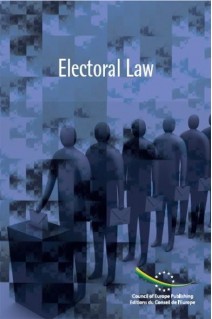



The European Commission for Democracy through Law, or Venice Commission, is the Council of Europe's advisory body on constitutional matters. It gives legal opinions on the development and operation of democratic institutions and constitutional law.The Venice Commission's work is aimed at upholding the three underlying principles of Europe's constitutional heritage: democracy, human rights and the rule of law. Since its inception, the Venice Commission has been particularly active in the field of elections, the cornerstone of democracy.This book is a compilation of the main Venice Commission texts dealing in general terms with elections and referendums. First come the reference documents: the Code of Good Practice in Electoral Matters and the Code of Good Practice on Referendums. These are followed by a judicious selection of general studies on such fundamental topics as recurrent challenges and problematic issues in electoral law in Europe, election systems, the representation of national minorities on elected bodies - through the application of general rules and specific measures - and a comparison of the legal rules on referendums in European states.This book is intended not only for election specialists (members of electoral commissions, academics etc) but also for observers, politicians and, more generally, any member of the electorate.
General introduction
Part 1 - Elections
Code of good practice in electoral matters - Guidelines and explanatory report
Introduction
Guidelines on elections
I. Principles of Europe's electoral heritage
II. Conditions for implementing these principles
Explanatory report
I. The underlying principles of Europe's electoral heritage
II. Conditions for implementing these principles
Conclusion
Interpretative Declaration on the Stability of the Electoral Law
Declaration on Women's Participation in Elections
Study on electoral law and national minorities
Introduction
I. Rules specifically providing for representation of minorities
II. The influence of electoral systems on the representation of political groups - What kind of general rules?
III. The effects of electoral systems on the representation of minorities
IV. Constituencies and the representation of minorities
V. Debate on the electoral system and national minorities
Conclusion
Questionnaire on participation of members of minorities in public life
Synopsis of replies to the questionnaire on participation of members of minorities in public life
Report on electoral rules and affirmative action for national minorities' participation in the decision-making process in European countries
Introduction
I. Affirmative action
II. Affirmative action and electoral rules
Conclusion
Appendix: Electoral law and national minorities
Report on electoral law and electoral administration in Europe - Synthesis study on recurrent challenges and problematic issues
I. Introduction
II. General remarks
III. The electoral administration structure
IV. The right to vote, and voter registration
V. The right to stand for election, and the registration of election subjects
VI. Election campaign
VII. The role of the media in election campaigns
VIII. Election observation
IX. Election day - The polling stations
X. Voter identification and voting procedures
XI. Vote count and the announcement of provisional results
XII. Election appeals and accountability for electoral violations
XIII. Final results and the electoral system
XIV. Conclusion
Appendix I: Opinions and recommendations of the Venice Commission
Appendix II: Reports and other documents of the Venice Commission
Appendix III: Reports of the Congress of Local and Regional Authorities of the Council of Europe
Appendix IV: Documents of the Parliamentary Assembly of the Council of Europe
Appendix V: Reports by the OSCE/ODIHR
Appendix VI: Further publications
Report on electoral systems - Overview of available solutions and selection criteria
Introduction
Part One - Electoral systems on offer
Part Two - Criteria for selecting a particular election system and the implications of that choice
Conclusion
Table summarising the three historical models
Part 2 - Referendums
Code of good practice on referendums
Introduction
Guidelines on the holding of referendums
I. Referendums and Europe's electoral heritage
II. Conditions for implementing these principles
III. Specific rules
Explanatory memorandum
General remarks
I. Referendums and Europe's electoral heritage
II. Conditions for implementing these principles
III. Specific rules
Referendums in Europe - An analysis of the legal rules in European states
Introduction
General comments
I. National referendums
II. Local and regional referendums
III. The future of referendums
Conclusion

The European Commission for Democracy through Law, or Venice Commission, is the Council of Europe's advisory body on constitutional matters. It gives legal opinions on the development and operation of democratic institutions and constitutional law.The Venice Commission's work is aimed at upholding the three underlying principles of Europe's constitutional heritage: democracy, human rights and the rule of law. Since its inception, the Venice Commission has been particularly active in the field of elections, the cornerstone of democracy.This book is a compilation of the main Venice Commission texts dealing in general terms with elections and referendums. First come the reference documents: the Code of Good Practice in Electoral Matters and the Code of Good Practice on Referendums. These are followed by a judicious selection of general studies on such fundamental topics as recurrent challenges and problematic issues in electoral law in Europe, election systems, the representation of national minorities on elected bodies - through the application of general rules and specific measures - and a comparison of the legal rules on referendums in European states.This book is intended not only for election specialists (members of electoral commissions, academics etc) but also for observers, politicians and, more generally, any member of the electorate.
Attention, en vertu de nos conditions générales de vente, l'achat des PDF/epub est réservé aux particuliers.
